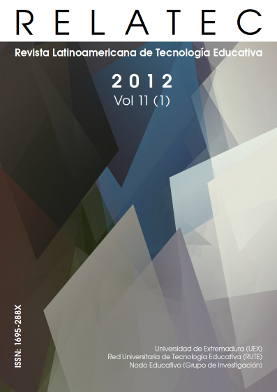La utilización de la web 2.0 por los estudiantes de Sociedad del Conocimiento de Educación Social y Pedagogía de la UNED
Keywords:
Sociedad del Conocimiento, uso de Internet, Educación Social, Pedagogía, Tecnología de la Información, Redes SocialesAbstract
Partimos del concepto «Nuevos Alfabetismos», donde lo «nuevo» se concibe desde una perspectiva sociocultural. El principal objetivo de investigación es conocer el uso realizado de los recursos de la Web 2.0 que realizan los estudiantes de la asignatura Sociedad del Conocimiento, Tecnología y Educación, del Grado de Educación Social y de Pedagogía de la UNED. El instrumento de evaluación ha sido una encuesta. Los recursos más utilizados son los vídeos y los menos los podcast. Los resultados indican que el alumnado no entiende estos nuevos recursos como prácticas innovadoras socioculturales que implican participación y colaboración en Red.
Starting from the concept of New Literacy where the “new” is conceived from a sociocultural perspective. The main aim of the research study is to measure the use given to the web 2.0 sources by the students of the Society of Knowledge, Technology, and Education subject from the UNED, Pedagogy and Social Education degree. The assessment method is a survey. The sources that are mostly used are those of the videos whereas the least used are the podcasts. The results indicate that the students do not view these new sources as innovating sociocultural work experience which imply participation and collaboration on line.
Downloads
Downloads
Published
Issue
Section
License
Authors who publish in this journal accept the following conditions:
1. The Author retains copyright in the article. Upon acceptance of the article, the author shall grant to the Publisher the right of first publication of the article. with the dcoument registered with the Creative Commons Attribution-NonCommercial-NoDerivative 4.0 International (CC BY-NC-ND) license, which allows to third parties to use what is published whenever they mention the authorship of the work and the first publication in this journal.
2. Authors can make other independent and additional contractual agreements for the non-exclusive distribution of the article published in this journal (eg, include it in an institutional repository or publish it in a book) provided they clearly indicate that the work was published for the first time in this journal.
3. Authors are allowed and recommended to publish their work on the Internet (for example on institutional or personal pages) before and during the review and publication process, as it can lead to productive exchanges and a greater and faster diffusion of published work (see The Effect of Open Access).









